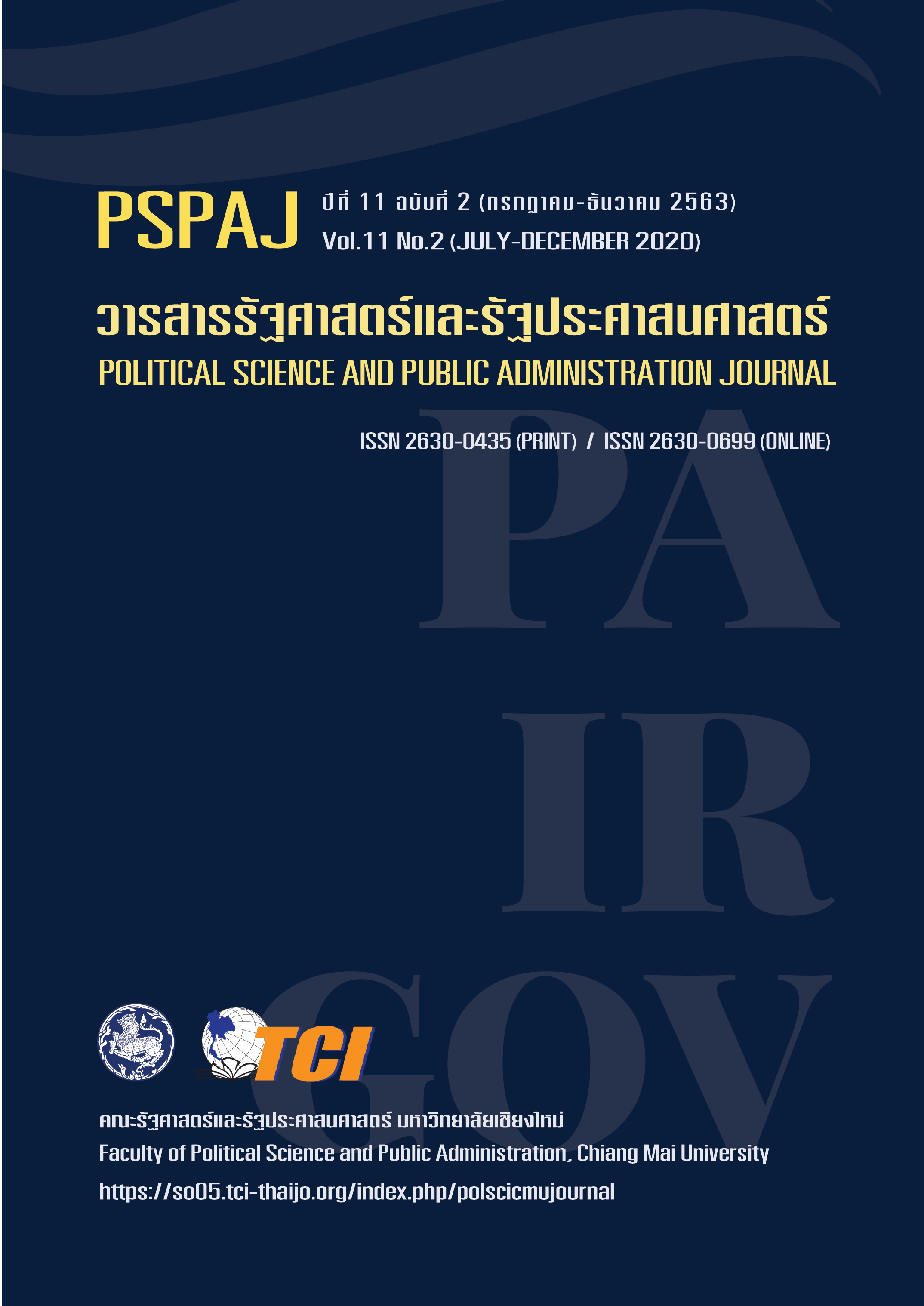ภาคีเครือข่ายการจัดการท่องเที่ยวของหมู่บ้านแม่กำปอง ตำบลห้วยแก้ว อำเภอแม่ออน จังหวัดเชียงใหม่
Main Article Content
บทคัดย่อ
บทความชิ้นนี้มีวัตถุประสงค์เพื่อ 1) ศึกษากระบวนการความร่วมมือระหว่างภาคีเครือข่ายภาครัฐ ภาคเอกชน ภาคประชาชน และนักท่องเที่ยวในการจัดการท่องเที่ยว 2) ศึกษาหลักการจัดการท่องเที่ยวเชิงอนุรักษ์ และ 3) ศึกษาผลลัพธ์ที่ได้จากการจัดการท่องเที่ยวของหมู่บ้านแม่กำปอง ซึ่งมีระเบียบวิธีวิจัยเชิงคุณภาพ โดยเก็บรวบรวมข้อมูลจากเอกสาร การสัมภาษณ์กึ่งโครงสร้าง การสนทนากลุ่ม และการสังเกตการณ์แบบไม่มีส่วนร่วม ผู้ให้ข้อมูล ประกอบด้วย ตัวแทนจากภาครัฐ ภาคเอกชน ภาคประชาชน และนักท่องเที่ยว รวม 36 คน ผลการศึกษา พบว่า 1) ภาคีเครือข่ายการจัดการท่องเที่ยวของหมู่บ้านแม่กำปอง กระบวนการความร่วมมือในทุกขั้นตอน ตั้งแต่ความร่วมมือในการจัดทำแผน การแลกเปลี่ยนข้อมูล ข่าวสาร มีความร่วมมือในการปฏิบัติ การประเมินผล ตลอดจนมีการทำบันทึกข้อตกลงร่วมกัน 2) การจัดการท่องเที่ยวของหมู่บ้านแม่กำปอง มีการนำหลักการจัดการท่องเที่ยวเชิงอนุรักษ์มา
ปรับใช้ได้อย่างครบถ้วน และ 3) ผลลัพธ์ที่ได้จากการจัดการท่องเที่ยวของหมู่บ้านแม่กำปอง สามารถบรรลุผลเป้าหมาย คือ มีการสร้างความร่วมมือ เกิดการสร้างงาน สร้างรายได้ ตลอดจนสามารถในการรักษาทรัพยากรธรรมชาติ วัฒนธรรม และวิถีชีวิตได้เป็นอย่างดี
Downloads
Article Details
- เนื้อหาและข้อมูลที่ลงตีพิมพ์ในวารสารรัฐศาสตร์และรัฐประศาสนศาสตร์ถือเป็นข้อคิดเห็นและความรับผิดชอบของผู้เขียนบทความโดยตรง ซึ่งกองบรรณาธิการวารสารรัฐศาสตร์และรัฐประศาสนศาสตร์ ไม่จำเป็นต้องเห็นด้วย หรือร่วมรับผิดชอบใดๆ
- บทความและข้อมูล ที่ได้รับการตีพิมพ์ในวารสารรัฐศาสตร์และรัฐประศาสนศาสตร์ ถือเป็นลิขสิทธิ์ของวารสาร หากบุคคลหรือหน่วยงานใดต้องการนำข้อมูลไปใช้ประโยชน์ในทางวิชาการ ขอให้อ้างอิงแหล่งที่มาด้วย
เอกสารอ้างอิง
กรมการท่องเที่ยว. (2559). มาตรฐานการท่องเที่ยวโดยชุมชนของอาเซียน. กรุงเทพฯ: กรมการท่องเที่ยว.
การท่องเที่ยวแห่งประเทศไทย. (2553). Thailand Tourism Awards 8th. กรุงเทพฯ: การท่องเที่ยวแห่งประเทศไทย.
จักร ติงศภัทิย์, และกฤษฎา ปราโมทย์ธนา. (2552). การบริหารงานภาครัฐแบบเครือข่าย: มิติใหม่ของภาครัฐ. กรุงเทพฯ: เอ็กซเปอร์เน็ท.
จักรพันธ์ ภูมิสุทธาผล. (2557). ปัจจัยที่มีผลต่อความสำเร็จของการท่องเที่ยวโดยชุมชนหมู่บ้านแม่กำปอง ตำบลห้วยแก้ว อำเภอแม่ออน จังหวัดเชียงใหม่. (วิทยานิพนธ์วิทยาศาสตรมหาบัณฑิต), มหาวิทยาลัยเชียงใหม่.
เดลินิวส์. (2560). 'ถอดรหัส'แม่กำปอง 'ชุมชนเข้มแข็ง' ร่วมมือร่วมใจ 'ยั่งยืน'. สืบค้นเมื่อ 20 สิงหาคม 2560, จาก https://www.dailynews.co.th
บุษกร ด้วงทอง, และวิโรจน์ เจษฎาลักษณ์. (2558). ความสัมพันธ์เชิงเศรษฐกิจระหว่างชุมชนกับการดำเนินงานด้านการท่องเที่ยวเชิงอนุรักษ์ของวนอุทยานปราณบุรี จังหวัดประจวบคีรีขันธ์. International Humanities, Social Sciences and arts, 8(2), 2123-2139.
พิฑูรย์ ทองฉิม. (2558). การจัดการความร่วมมือด้านการท่องเที่ยวโดยชุมชนเกาะลันตา จังหวัดกระบี่. (วิทยานิพนธ์บริหารธุรกิจมหาบัณฑิต), มหาวิทยาลัยสงขลานครินทร์.
วรสุดา สุขรมณ์. (2554). ความร่วมมือระหว่างองค์การในการพัฒนาอุตสาหกรรมการท่องเที่ยวของไทย. (ดุษฎีนิพนธ์ปรัชญาดุษฎีบัณฑิต), มหาวิทยาลัยรามคำแหง.
วรินทร์ธร ธรสารสมบัติ. (2556). ความร่วมมือระหว่างภาครัฐ ภาคเอกชน และชุมชนในการพัฒนาการท่องเที่ยว. (ดุษฎีนิพนธ์รัฐประศาสนศาสตรดุษฎีบัณฑิต), มหาวิทยาลัยรามคำแหง.
วีระศักดิ์ เครือเทพ. (2550). เครือข่ายนวัตกรรมการทำงานขององค์กรปกครองท้องถิ่น. กรุงเทพฯ: สำนักงานกองทุนสนับสนุนการวิจัย (สกว.).
สถาบันวิจัยวิทยาศาสตร์และเทคโนโลยีแห่งประเทศไทย. (2542). การดำเนินการเพื่อกำหนดนโยบายการท่องเที่ยวเชิงนิเวศ. กรุงเทพฯ: การท่องเที่ยวแห่งประเทศไทย.
สมศักดิ์ สามัคคีธรรม, และปรีดา วานิชภูมิ. (2556). การจัดการภาคีสาธารณะแนวใหม่: ความหมาย และนัยสำคัญ. วารสารเศรษฐศาสตร์การเมืองบูรพา, 1(1), 183-214.
สำนักงานปลัดกระทรวงการท่องเที่ยวและกีฬา. (2560). รายงานภาวะเศรษฐกิจท่องเที่ยว. กรุงเทพฯ: เอ็กเซลเลนท์ บิสเนส แมเนจเม้นท์ จำกัด.
สำนักพัฒนาเศรษฐกิจและสังคมภาคตะวันออกเฉียงเหนือ. (2556). รายงานผลการศึกษาการท่องเที่ยวเชิงนิเวศอย่างยั่งยืนบนเส้นทางสีเขียว กรณีพื้นที่ภาคตะวันออกเฉียงเหนือ. ขอนแก่น: สำนักพัฒนาเศรษฐกิจและสังคมภาคตะวันออกเฉียงเหนือ.
อัมพร ธำรงลักษณ์. (2553). การบริหารปกครองสาธารณะ: การบริหารรัฐกิจในศตวรรษที่ 21. ปทุมธานี: โครงการตำราและสิ่งพิมพ์ คณะรัฐศาสตร์มหาวิทยาลัยธรรมศาสตร์.
Agranoff, R., & McGuire, M. (2001). Big Questions in Public Network Management Research. Journal of Public Administration Research and Theory, 11(3), 295-326.
Anderson, W. (2009). Promoting ecotourism through networks: case studies in the Balearic Islands. Journal of Ecotourism, 8(1), 51-69.
Ceballos-Lascurain, H. (1996). Tourism, Ecotourism, and Protected Areas: The State of Nature-based Tourism around the World and Guidelines for its Development. Gland: Iucn.
Cheema, G. S. (2004, May). From Public Administration to Governance: The Paradigm Shift in the Link between Government and Citizens. In 6th Global Forum on Reinventing Government: Toward Participatory and Transparent Governance, Seoul, Republic of Korea.
Coria, J., & Calfucura, E. (2012). Ecotourism and the Development of Indigenous Communities: The Good, the Bad, and the Ugly. Ecological Economics, 73, 47–55.
Kennett, P. (2010). Global Perspectives on Governance. In Osborne, S. P. (Ed.). The New Public Governance: Emerging Perspectives on the Theory and Practice of Public Governance (pp. 19–35). New York: Routledge.
Loffler, E. (2005). Governance and Government: Networking with External Stakeholders. In Bovaird, T., & Loffler, E. (Eds.). Public Management and Governance. London: Taylor & Francis Group.
Osborne, S. P. (2010). The New Public Governance: Emerging Perspectives on the Theory and Practice of Public Governance. New York: Routledge.
O'Toole, L. J., & Meier, K. J. (2004). Desperately Seeking Selznick: Cooptation and the Dark Side of Public Management in Networks. Public Administration Review, 64(6), 681-693.
Thomson, A. M., & Perry, J. L. (2006). Collaboration processes: Inside the black box. Public administration review, 66(S1), 20-32.
Winkler, T., & Zimmermann, F. (2015). Ecotourism as Community Development Tool Development of an Evaluation Framework. Current Issues of Tourism Research, 4(2), 45-56.


